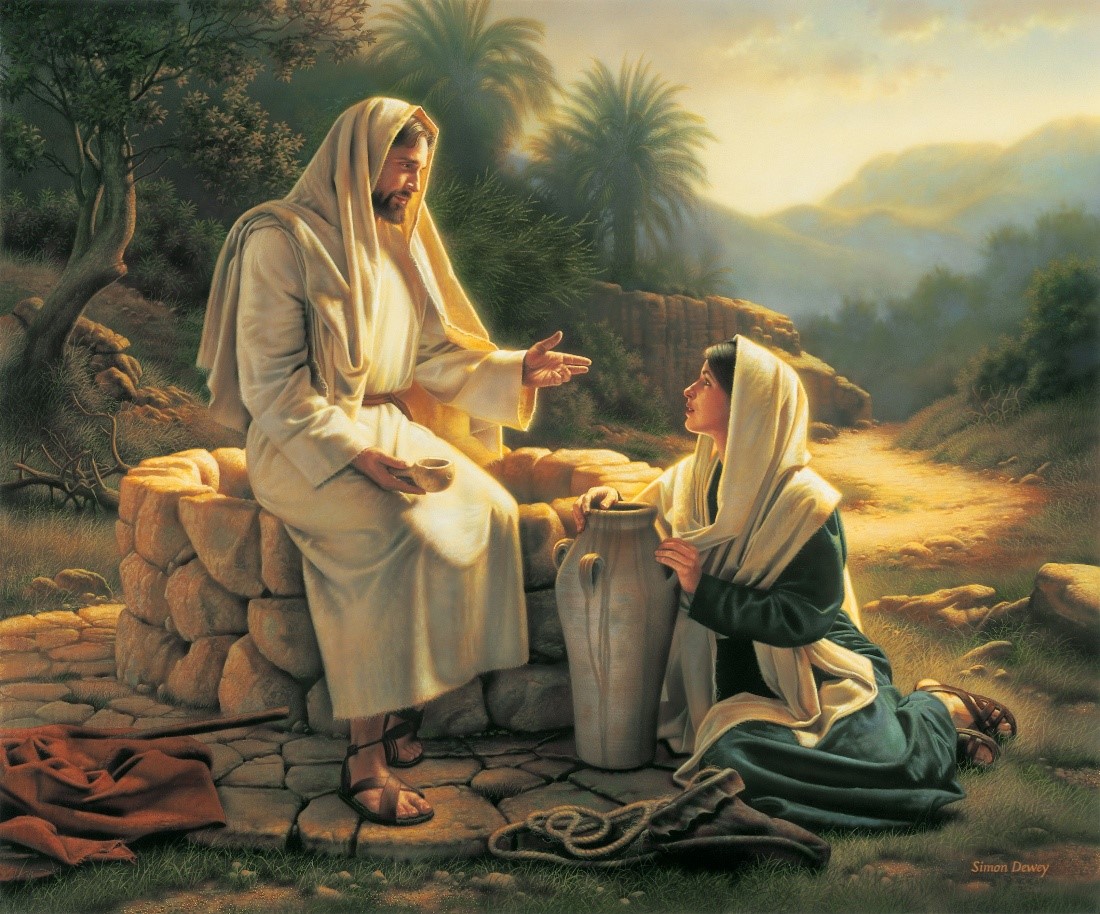To accompany your Come Follow Me study for February 6-12
In addition to reading the indicated chapters, you may wish to:
- Read the applicable portions of the New Testament Institute Student Manual at
- https://www.churchofjesuschrist.org/study/manual/old-testament-student-manual-kings-malachi/chapter-34?lang=eng
- https://abn.churchofjesuschrist.org/study/manual/new-testament-student-manual/introduction-to-the-gospel-according-to-st-john/chapter-22-john-2-4?lang=eng
- See any or all of the following videos:
- See the video Jesus and the Woman at the Well at https://abn.churchofjesuschrist.org/study/video/presentations/1996-06-03-lesson-5-the-woman-at-the-well?lang=eng
- See the Visual Bible: Gospel of John, minutes 12:20-34:13, at https://www.youtube.com/watch?v=kAAZ6HPXdMU
If you would like a Kahoot game related to this material which you could use for personal study or use with your family or your class, click here: https://create.kahoot.it/share/john-2-4/63b06083-14e8-4eb1-bbae-9c907854da88. (To use it with a group, after clicking on this link, you will need to log into Kahoot, creating a free account if you have not done so previously, then click on the blue “Start” button.)
Points to Ponder in John 2-4
1. What two major purposes were served by Jesus’ first recorded miracle? Do all miracles fulfill one or the other or both purposes?
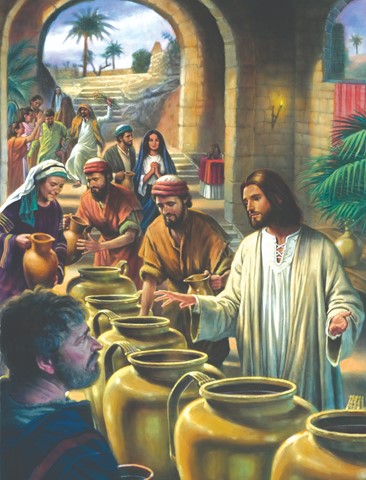
2. Why do you likely prefer the Joseph Smith Translation version of the story of the turning of water to wine over the King James Translation? What are the essential differences?
3. What else of importance do we learn from the fact that Jesus would not only attend a wedding feast but would provide the refreshments?
4. Which of the two suggested video versions of Jesus’ cleansing the temple do you prefer, and why?
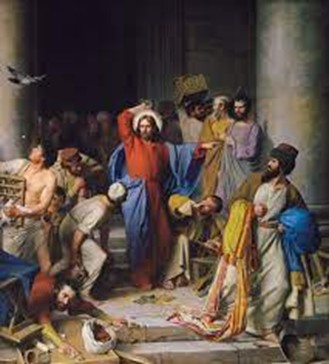
5. John 2:17 quotes an Old Testament passage which Jesus’ disciples found applicable on the occasion of the cleansing of the temple. But in the King James Version, it sounds rather strange: “The zeal of thine house hath eaten me up.” Look at various other translations as found at https://www.biblegateway.com/verse/en/John%202:17. Which one do you like best?
6. What current applications can you think of for the principles taught by Jesus’ driving the money changers from the temple?
7. What do we know about Nicodemus? Why would he come to Jesus by night rather than during the day?
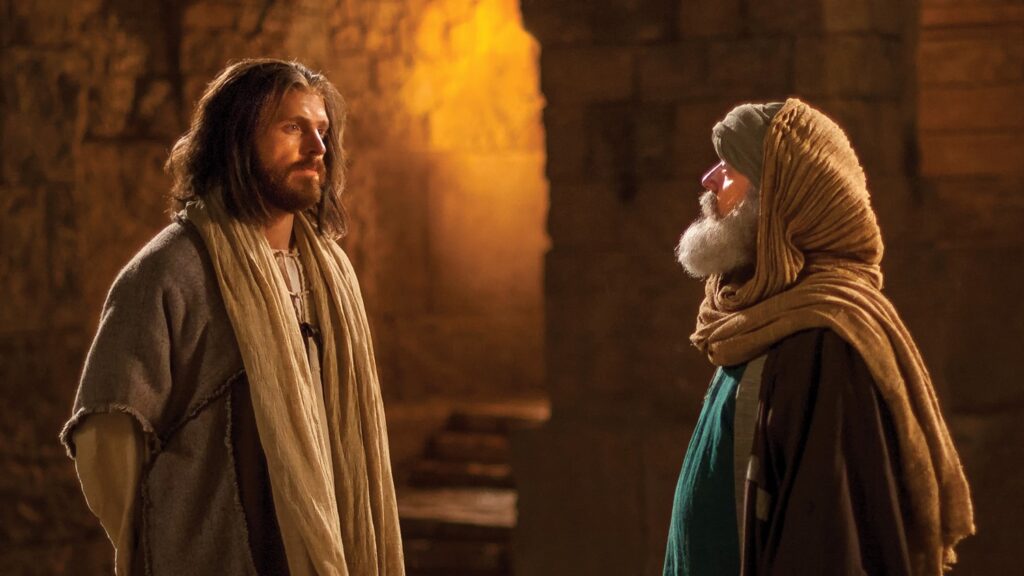
8. Being “born again” is essentially the same as which of the following?
a. being baptized
b. being confirmed
c. receiving the Holy Ghost
d. achieving exaltation
e. a false Protestant notion which has no place in the true church
9. Why don’t Latter-day Saints use the phrase “born again” more often?
10. How many important principles relating to baptism are taught in John 3?

11. What importance do you see in the change Joseph Smith made to John 4:2, which he rendered as: “Though he himself baptized not so many as his disciples, for he suffered them for an example, preferring one another”?
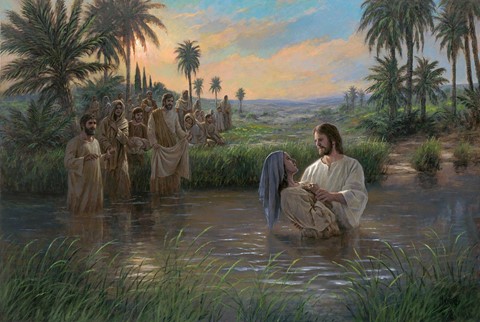
12. What most impresses you about the story of Jesus’ encounter with the adulterous woman at Jacob’s well?
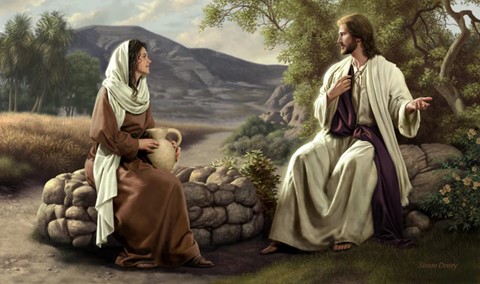
13. Many religions base their teaching that God has no body in part on John 4:24. How do you explain that passage? What other explanations could you offer?
14. What else did you find in today’s reading that you considered inspirational, interesting, or puzzling?
Possible Answers to Points to Ponder in John 2-4
1. What two major purposes were served by Jesus’ first recorded miracle? Do all miracles fulfill one or the other or both purposes?
The turning of water into wine
- Provided a useful service to others in need.
- Served to strengthen the faith of those whose faith was weaker than it needed to be.
I am unaware of any miracles from a divine source which don’t fulfill at least one (and often both) of these same purposes.
2. Why do you likely prefer the Joseph Smith Translation version of the story of the turning of water to wine over the King James Translation? What are the essential differences?
There are two essential differences between the two versions, each of which makes more sense in the JST:
- In the KJV, Jesus seems to speak rudely to His mother and to not be interested in her concern about the lack of wine. In the JST, He is clearly eager to do whatever she asks of Him.
- In the KJV, it could appear that following this miracle, Jesus’ disciples finally believed in Him. In the JST, they clearly previously believed but now believed even more strongly.
3. What else of importance do we learn from the fact that Jesus would not only attend a wedding feast but would provide the refreshments?
We learn that the Savior condoned wholesome social events, approved of marriage, and was interested in helping friends avoid embarrassment such as they would have felt had the host run out of wine and been unable to provide more.
4. Which of the two suggested video versions of Jesus’ cleansing the temple do you prefer, and why?
Your choice. I personally prefer the Church’s Bible Videos version of this event over the Gospel of John Visual Bible. Both show Jesus as using force and being quite adamant that the temple grounds were not an appropriate place for buying and selling. But the Gospel of John Visual Bible makes Him look out of control. I think the Savior was always in superb control of His emotions.
5. John 2:17 quotes an Old Testament passage which Jesus’ disciples found applicable on the occasion of the cleansing of the temple. But in the King James Version, it sounds rather strange: “The zeal of thine house hath eaten me up.” Look at various other translations as found at https://www.biblegateway.com/verse/en/John%202:17. Which one do you like best?
Your choice. My own preference may be the one from the Good News Translation, as quoted in the Visual Bible: Gospel of John, which says: “My devotion to your house, O God, burns in me like a fire.”
6. What current applications can you think of for the principles taught by Jesus’ driving the money changers from the temple?
We may wish to be equally zealous to keep the temple a place of purity and holiness through such means as:
- Ensuring that our lives are worthy of our being there.
- Speaking in a reverent voice within the temple.
- Speaking only of spiritual topics while within the temple.
- Helping keep papers, food crumbs, and other debris off of the temple floor.
- Picking up debris from the temple grounds when we discover it.
We may also take a lesson from Jesus’ courage in single-handedly speaking up and taking action when such was warranted.
7. What do we know about Nicodemus? Why would he come to Jesus by night rather than during the day?
He is presented as a “ruler of the Jews,” a member of the Sanhedrin. His words to Jesus show that he believed in Jesus. He was later willing to defend Him before the Pharisees (John 7:50) and bring spices to His burial. (John 19:39.) But his coming to Jesus by night could suggest he was reluctant to be seen as a full disciple. Perhaps he feared loss of social or political status. It is hard not to see him as among those described in D&C 76:79, “who are not valiant in the testimony of Jesus” and therefore “obtain not the crown over the kingdom of our God.”
8. Being “born again” is essentially the same as
a. being baptized
b. being confirmed
c. receiving the Holy Ghost
d. achieving exaltation
e. a false Protestant notion which has no place in the true church
The correct answer would be “c”: to not only be confirmed but to actually receive the Holy Ghost and live under its influence. Being “born again” is not to have achieved perfection but to have begun on the road thereto, just as a newborn baby is just starting out to become a fully mature adult.
9. Why don’t Latter-day Saints use the phrase “born again” more often?
Good question! The scriptures, both ancient and modern, certainly use the term frequently enough. But since some Christians, especially evangelical Protestants often use the term a bit differently, to describe a state of having been “saved” with a guarantee of heavenly glory, some Latter-day Saints may shy away from using the same phraseology lest they be misunderstood as meaning the same thing.
10. How many important principles relating to baptism are taught in John 3?
They include:
- Its absolute necessity: “Except a man be born of water and of the Spirit, he cannot enter into the kingdom of God.” (3:5) Those of other faiths have struggled to reconcile this iron-clad requirement with God’s mercy, since so many, including innocent children, have died without having had the opportunity for baptism. That reconciliation only becomes possible with the understanding of the principle of vicarious baptism for the dead, as practiced in Latter-day Saint temples.
- John 3 implies that baptism is for adult believers, not for infants. It says, “Except a man be born again,” not “except a baby be born again.”
- It also implies an additional ordinance of confirmation for conferring the gift of the Holy Ghost. This is spelled out even more clearly in the book of Acts, but even in John 3 it is clear that being born of water alone is not enough but must be accompanied by being born of the Spirit as well.
- Immersion is implied as being the proper mode of baptism, as John baptized in a place where there was much water. If sprinkling were acceptable, a glassful would have sufficed.
11. What importance do you see in the change Joseph Smith made to John 4:2, which he rendered as: “Though he himself baptized not so many as his disciples, for he suffered them for an example, preferring one another”?
It would appear that Jesus indeed personally performed baptisms, showing that He did not shy away from getting Himself wet or performing the physical labor associated with the ordinance. But evidently, He let His disciples baptize more than He did, giving them the honor of officiating so they would learn how to do it and learn that it was a privilege to so do. No doubt He hoped that they would follow His example by delegating to other priesthood holders the opportunity to perform the ordinance as often as possible. In the Church today, wise priesthood leaders similarly look for opportunities to let new priests and elders exercise their priesthood as often as possible rather than think that members will consider an ordinance more “special” if performed by the bishop, elders quorum president, or stake president.
12. What most impresses you about the story of Jesus’ encounter with the adulterous woman at Jacob’s well?
Your choice. My answer would include:
- Jesus showed that He was above the prejudice the average Jew felt toward their Samaritan neighbors.
- He likewise didn’t condemn the woman for her past multiple marriages or present adulterous relationship but offered her the opportunity to rise above her past.
- We see in this story progressive steps toward conversion:
- 4:15: “Sir, give me this water, that I thirst not.”
- 4:19: “I perceive that thou art a prophet.”
- 4:25: “I know that Messias cometh, which is called Christ: when he is come, he will tell us all things.”
- 4:28-29: “The woman then left her waterpot, and went her way into the city, and saith to the men, Come, see a man, which told me all things that ever I did.”
- 4:29: “Is not this the Christ?”
13. Many religions base their teaching that God has no body in part on John 4:24. How do you explain that passage? What other explanations could you offer?
First, the original Greek does not say God is “a spirit,” but simply that “God is spirit,” as is attested by multiple translations other than the King James. John later in 1 John 1:5 tells us that “God is light,” and in 1 John 4:8 that “God is love.” But few would argue that “love is God,” or that God has no attributes at all other than His love or His light. Similarly, the fact that “God is spirit,” or the embodiment of spirituality, needn’t negate His also having a body. Jesus took great pains following His resurrection to prove to His disciples that “a spirit hath not flesh and bones, as ye see me have.” If Christ has a tangible body, why would we doubt that His Father likewise would have one?
Joseph Smith recognized that something was wrong with this passage when he worked on his inspired revision. He rendered it: “For unto such hath God promised his Spirit: and they who worship him must worship in spirit and in truth.” But the passage is also true as at appears in the King James Version, if properly understood.
14. What else did you find in today’s reading that you considered inspirational, interesting, or puzzling?
Your choice. My list includes:
- Jesus’ reference to His body as a temple (2:20-21). Paul later elaborates on this in 1 Corinthians, but Jesus is the first on record to make the analogy.
- 2:24: In the JST, “he knew all things.” Though Jesus grew from grace to grace and didn’t receive the fulness all at once, by the time of John 2 He evidently was sufficiently omniscient to warrant Joseph Smith’s change in this passage.
- John 3:16: No one should love this familiar passage more than Latter-day Saints!
- John 3:17: God and Jesus are not interested in condemning us for our imperfections but in helping us rise above them.
- John 3:19: “Men loved darkness rather than light, because their deeds were evil.” Though the Savior is no doubt speaking primarily of spiritual light here, there does seem to be an interesting correlation between physical darkness and spiritual darkness. It may be more than coincidental that bars and dance halls tend to be darkened and that more crime and sin seems to be committed at night than during the day.
- John 3:30: John’s humility is shown in his reference to Jesus, “He must increase, but I must decrease.”
- John 4:34: Jesus’ absolute devotion to His mission shows in his statement, “My meat is to do the will of him that sent me, and to finish his work.”
- John 4:46-54: Jesus heals a nobleman’s son from long distance.
